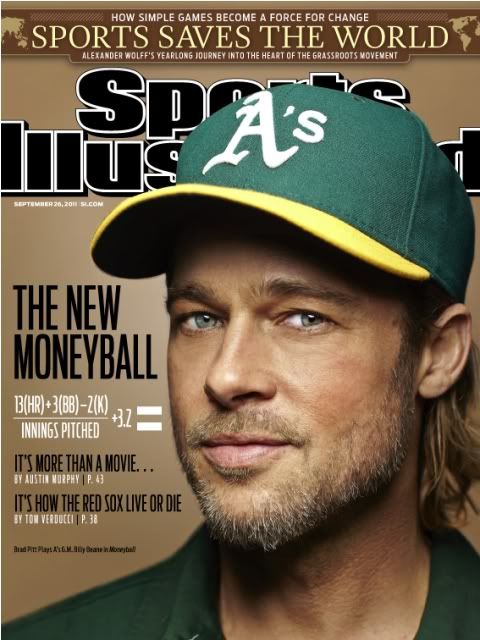 The ground-breaking book Moneyball was published way back in 2003, but only now, eight years later, it has finally jumped from the talk of the baseball world to the focal point of mainstream entertainment.
The ground-breaking book Moneyball was published way back in 2003, but only now, eight years later, it has finally jumped from the talk of the baseball world to the focal point of mainstream entertainment.
Don’t believe me? Then clearly you haven’t seen Brad Pitt on the cover of this week’s Sports Illustrated. And note that it isn’t just Pitt doing the standard “hey, I’m a regular guy who likes baseball too” photoshoot, but instead it is Pitt still channeling Billy Beane, complete with A’s cap and all. Maybe I’m just reading into the tea leaves a bit too much here, but it sure seems like the Moneyball revolution is going to come back around again and quick.
In the baseball world, the Moneyball philosophy never really left. Almost every team in baseball now uses statistical analysis to either drive or complement the decision-making process of their front office. Even filthy rich teams like the Red Sox have embraced the way of thinking Beane popularized in terms of scouring the market for inefficiencies that can be exploited. This movie won’t make a lick of difference to any of them.
Nor will the movie make a major impact on a growing set of hardcore baseball fans who all have already read and digested what Moneyball has to offer. The explosion of sites like Baseball-Reference and FanGraphs is a testament to just how wholly sabermetrics has become a part of being a die-hard baseball fan. Alas, casual fans remain largely aloof.
Even though it seems most of the baseball-loving world is at least aware of the existence of WAR and has possibly even heard someone mention FIP or BABIP before, we are all still slaves to more basic and, dare I say, archaic stats of the pre-Moneyball era. For example, Ian Kennedy is a fine pitcher and all, but he is going to get a lot more Cy Young votes than he probably deserves based largely on him having 20 wins. If you don’t understand why that is a comical example, well, then you probably need to buy opening night tickets for the premier of Moneyball at a theater near you. Or you could just get the full scoop by reading the book, which you probably won’t do if you have already ignored it this long.
This is why I hope Moneyball can be just as successful at the box office as it was on the bookshelf. Maybe I am just being selfish, but I would love to have a conversation with a random baseball fan without having to wonder if they are going to know what I mean when I say “ISO.” Or how much better my life would be if my father comprehended UZR so that he would quit telling me that Derek Jeter is such a great fielder by virtue of his many Gold Gloves. And maybe, just maybe, my dream of seeing a baseball TV broadcast that, when a batter steps to the plate for the first time, shows his WAR, wOBA and BB/K instead of the tired old AVG, HR and RBI stat line.
This isn’t to say that every single baseball fan must become a slave to advanced stats, but should they not at least be cognizant of why it is the supposed nerds are so crazy for statistics?
I beg you non-stat savvy friends, take some time this weekend to check out Moneyball. It might be a dramatized and watered down version of what Michael Lewis was really writing about, but it can still be both entertaining and educational. If Brad Pitt’s charm, Aaron Sorkin’s writing and Jonah Hill’s sweaty awkwardness can’t win you over, I don’t know what will.
